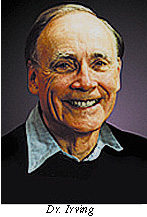1998
Dr. Ted Irving of Old English Poetry
Dr. Edward B. Irving, Jr., professor of English--called Ted by colleagues and friends throughout his 33 years at Penn-died on March 6 at the age of 75, in Cincinnati.
A Philadelphian who took his B.A. at Haverford and his M.A. and Ph.D. at Yale, Dr. Irving taught at Yale from 1954 to 1960, when he joined Penn as associate professor of English. He became full professor in 1970 and emeritus professor in 1993.
He had established his scholarly reputation early, in books that proved to have lasting value: The Old English Exodus (Yale 1953) came out again with Archon Books in 1970. The prize-winning A Reading of Beowulf, (Yale 1968) had a second life as a paperback and portions of it were reprinted in 1975 in the Norton Critical Edition of Beowulf. The Introduction to Beowulf he did for Prentice-Hall's Landmarks in Literature series (1969) was also reissued later in paperback. The Penn Press paperback edition of his Rereading Beowulf (1992) is still in print.
Dr. Irving several times chaired the Old English group of the Modern Language Association and was a reviewer for Speculum and for the PMLA. He lectured widely in the U.S. and abroad, both in the British institutions and on the continent where, in 1986, he took Beowulf on tour to the Swiss universities of Basel, Bonn, Geneva, Neuchâtel and Zürich.
In his articles he wrote not only about Beowulf and other Old English poems, but also about writing, about the oral tradition, and about poetry as poetry. He taught still more broadly, presenting Shakespeare and Chaucer one year, taking up James Joyce's Ulysses the next. He was especially known for his General Honors course in the art of poetry.
The common thread was words. As his colleague Dr. Robert Regan said,
Philologists ought to be impassioned about words; too often they seem merely dizzy about etymologies. It was not so with Ted Irving. Both by his lucid and eloquent writing and by his teaching, he drew others into the small company of readers who treasure the monuments of Anglo-Saxon poetry. One of his students, a woman who had started Anglo-Saxon in England, put it this way: "Old English had been half curiosity, half challenge for me, rather like the Times of London crossword. Dr. Irving opened my eyes to great poets, nameless, most of them, but as alive and as powerful as Milton or Keats." Others who have shared that woman's experience will stand permanently in the debt of a great teacher, Edward Irving.
Dr. Irving is survived by his wife, poet and novelist Dr. Judy Moffett, who took her Ph.D. here and was also on the faculty in English; his two sons, Andrew M. (Sandy) Irving and Edward B. (Terry) Irving, III; his daughter, Alison Irving Hall, C '78; his brother, Robert Irving, C '51; and six grandchildren, Christo, Katy, Charlotte, Peggy, Megan and Erin.
Service April 4: A memorial service will be held Saturday, April 4, at 2 p.m. at the Friends Meeting House in Swarthmore. In lieu of flowers the family ask contributions, in time or money, to the American Friends Service Committee, 1501 Cherry Street, Philadelphia PA 19102.

 Department of English
Department of English
